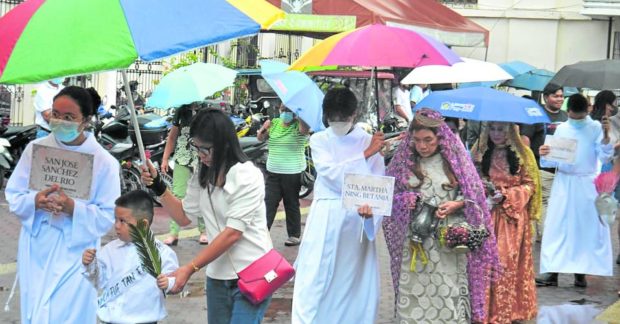
RELIGIOUS CHARACTERS | Instead of parading as creepy and ghoulish creatures, Catholics in Betis, Guagua town, in Pampanga wear costumes of saints in a celebration on Sunday, ahead of Tuesday’s All Saints’ Day. (From Betis Heritage Chuch BETIS HERITAGE CHURCH-SANTIAGO APOSTOL PARISH FACEBOOK
GUAGUA, Pampanga, Philippines — Catholics on Sunday paraded again as saints in this town that observes the feasts of the saints and souls for nine straight days, which is the longest rite of its kind in the country.
The “Parade of Saints” at St. James the Apostle Parish, also known as Betis Church, resumed almost three years into the COVID-19 pandemic, according to parish priest Fr. Raul delos Santos.
At least 45 youth and adults from 25 chapel pastoral councils and organizations gathered for the occasion, which carried the theme “Tara nang Abe-abe, Makiwangis karing Banal Tamung Kayantabe (Let’s Come Together, Imitate the Lives of our Holy Companions).”
In full regalia, they paraded on the streets of Betis, an old town with seven villages attached in 1904 to the younger town of Guagua.
They held the second parade inside the church, a declared National Cultural Treasure in 2005 for its visual catechism. The lives of the saints were shared in short narratives.
Delos Santos joined as Padre Pio in the first parade held in 2019. This time around, he skipped the event for health reasons. His vicar, Fr. Gian Sagum, led it instead.
‘True spirit’
“We want to bring out the true spirit of all the saints and not the creepy creatures of Hollywood. The saints are worth remembering and honoring,” Delos Santos told the Inquirer.
The organizations, villages or participants paid for the costumes.
“We had fun and we also catechized parishioners on the lives of saints,” he added.
For their “closest portrayal,” Hannah Clemente won first place as Sta. Jacinta; Carlos David, second place, as St. Pope John Paul II; and Jean Andrei Cayanan, third place, as San Francisco.
Special awards went to Myrna Roque (Mother Teresa of Calcutta), Betty Danganan (Virgin of Guadalupe), Jacob Pacatcatin (San Juan Nepomuceno); Edna Montoya, who portrayed St. Claire.
“This is such a great take off on the anticipated holiday, which is All Saints’ Day on the 1st day of November,” the Betis Heritage Church-Santiago Apostol Parish Facebook page said on Monday.
The “daun,” or feast of the dead in Betis, is held at San Nicolas de Tolentino Cemetery in Barangay San Nicolas.
Devotees would come to the tomb every day for nine days to stay with their dearly departed, recite the rosary, offer flowers and light candles.
Tomb blessing
The Masses for the dead at the cemetery were scheduled to resume on Nov. 1. The blessing of tombs and mausoleums was done by priests in the last two years.
A long Kapampangan prayer for the dead, called “Decenario,” is also recited in Betis.
Old folk like Consuelo “Apung Telo” Mendoza have a copy of the “Novena Caring Caladua Qng Purgatorio (Novena for Souls in Purgatory),” originally written in Spanish by Fr. Jose March and complete with an illustration of San Nicolas de Tolentino, patron saint for the souls in purgatory.
The cemetery gives a humorous but profound reality check, while the arches on the gates share the message: “Aku ngeni, Ika bukas (I’m dead now, you too will die tomorrow).”